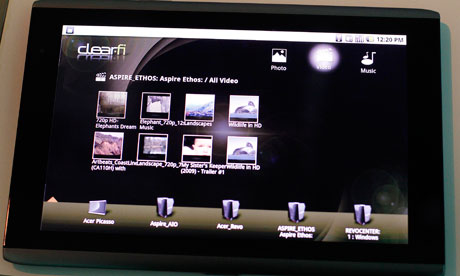
The Acer 10.10 Android touchscreen tablet. Acer is launching a range of tablet computers to help it compete with Apple's iPad.
When Steve Jobs in January described the new iPad tablet computer as "magical", PC manufacturers perhaps didn't imagine that the magic would be to subtract(扣除) money from their bottom line and add it to Apple's.
But that's how it's turning out. The research firm, Gartner, has slashed(削减) its forecast(预言) for the number of PCs that will be sold this year from 363.5m to 352.4m. And that higher figure was itself a downgrade(降低) from March, when the company thought that 366m PCs could be sold this year.
The reason for the downgrade is growing interest in Apple's iPad and similar tablet computers, allied to(联合) shrinking budgets among consumers.
The abrupt(突然的) drop is part of a trend that will become a long-term one, according to Ranjit Atwal, Gartner's research director. "Over the longer term, media tablets are expected to displace(取代) around 10% of PC units by 2014," he said, adding that the new forecasts reflect "expectations of weaker consumer demand, due in no small part to growing user interest in media tablets such as the iPad".
Other analysts think that growing user interest can already be quantified. Last week, Citigroup's analysts forecast that 35m tablet computers, including 26m iPads, will be sold in 2011 – and that those will lop off 11m PC sales that would otherwise have been made by companies such as HP and Dell.
Craig Berger, of FBR Capital Markets, offers higher estimates for 2011 – of 40m tablets sold by Apple and 30m by other companies – and says that the economics of tablets "are not good for PCs". He calculates that every five tablets sold means two lost PC sales. Berger's numbers would suggest 28m lost PC sales – and given that Gartner has already trimmed its numbers by 10m this year since the iPad launched, Berger's figure might not be fanciful.
Meanwhile, Gartner forecasts that worldwide PC shipments for 2011 will reach 409m units, a 15.9% increase from 2010 – but substantially(充分地) reduced from its earlier estimate of 18.1% growth for next year. It's entirely possible that further downgrades will follow.
Is this the end of the PC business that has sustained dozens of PC makers, and Microsoft in particular, over the decades since the launch of the very first version of Windows on 20 November 1985, just over 25 years ago? Microsoft makes its money from the licences for Windows on PCs, plus sales of its Office suite to a sizeable proportion of PCs that are used by businesses.
But if the PC sales engine starts to slow, so will Microsoft's. And Gartner has bad news on the business front too: it predicts that by 2013, 80% of businesses will support tablet computers for their staff, and that rather than providing employees with business services and devices – that is, PCs – 90% will support corporate applications on employees' own consumer phones, tablets and laptops.
Ray Ozzie, who last month stepped down as Microsoft's chief software architect – a post previously held by Bill Gates – has already warned the company about this scenario.
In October, in an elliptical farewell email, which he also put on his blog, he urged its executives to look ahead to a "post-PC world" and warned: "Those who can envision a plausible future that's brighter than today will earn the opportunity to lead." Or, to put it another way, those who stick to the PC-centric view will get left behind.
The PC market's growth is not uniform. It has almost stopped in the US and Europe. The only bright light at present is emerging markets such as Asia, which Gartner says are driving sales: by the end of next year such countries will make up more than 50% of the world PC market, while "mature" markets – especially the US and Europe – will face "mounting challenges" as both businesses and consumers put off new purchases and instead buy smartphones or tablets instead.
And even in emerging markets the story is not all good news for the traditional PC companies. "There is a good chance that consumers will simply leapfrog PCs and move directly to alternative devices in the coming years rather than following the traditional pattern of purchasing a PC as their first computing device," suggests Gartner, blaming PC makers' failure to innovate.
Chip speeds are not doubling as they once did; where a decade ago, faster graphics and processors were guaranteed every few years and made new PCs a must-have, most people now have more computing power than they need. And even though Microsoft can say that Windows 7 is its fastest-selling version of Windows ever, the reality is that many businesses are downgrading their licences and instead running Windows XP, from 2001, while many consumers are also sticking with XP.
That could mean that companies which usually head(主管) the PC sales numbers will see their revenues head south too, unless they can leap onto the tablet bandwagon(时尚,浪潮). HP, Acer and Toshiba – which, along with Dell and Lenovo, make up the top five sellers worldwide – have all announced moves into the tablet market, although analysts predict they will find it tough amid brutal(残酷的) price competition.
Oddly, the only computer maker that seems immune to(不受影响的) this cannibalisation(调拨) of the market is Apple, which has seen its computer sales grow significantly faster than the market this year. Maybe Jobs was right. The iPad is certainly having a magical effect on his company – even if not on any others.

